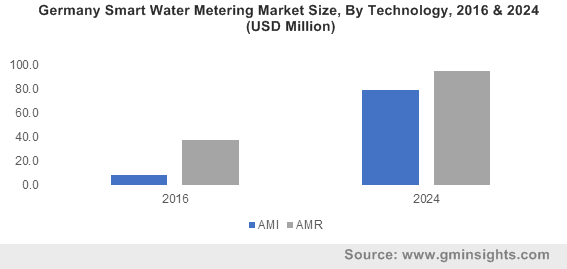AMI based smart water meter market to witness robust growth over 2017-2024 with an anticipated CAGR of 28%
Publisher : Fractovia | Published Date : 2017-04-21Request Sample
With the digital revolution making headway in the water industry, smart water meter market is turning out to be the next opportunistic spot for potential investors. Changing demographics, water scarcity, and the substantial requirement of operational efficiency are demanding new business models in the water sector. Indeed, sustainable utilization of water has become an absolute need of the hour, quite conspicuous from the extensive initiatives undertaken worldwide with regards to water conservation. As per The United Nations World Water Development Report 2015, the world is forecast to face nearly 40% water deficit by 2030, under the business as usual climate scenario. Not to mention, the prediction itself calls for an urgent requirement of dramatically changing the way water is utilized, managed, and transmitted. Emergence of sustainable water management solutions to deliver more prognostic and proactive services has played a pivotal role in propelling smart water meter industry trends.
While the business space is relatively a new field, it has evolved with extreme rapidity over the past few years, as increasing number of water utilities are integrating real-time data analytics in varied operations to improve the service model. The backbones of smart water meter market are AMR (automatic meter reading) technology and AMI (advanced meter infrastructure) technologies. In fact, AMI based market is projected to witness a robust growth of 28% CAGR over 2017-2024, on virtue of its excellent credential to streamline billing process. Water utilization data assembled by AMI-based smart meters help to recognize problems in water distribution and manage its allocation in an efficient manner, which by extension serve consumer requirements. While AMI is relatively advanced, high cost associated with the system may deter the growth path to some extent.
France Smart Water Metering Market Size, By Application, 2016 & 2024 (Million Units)

Residential sector is one of the prominent terrains that has benefited the most from the increasing proliferation of AMI based smart meters. In fact, smart water meter industry share from residential application is slated to cross billion-dollar frontier by 2024. The projected dominance of this particular business vertical can be majorly attributed to the increasing demand for accurate water bills and effective formulation of unregulated water spending. With the introduction of these meters, financial issues and pipeline leakages are better handled as they track real time water consumption and reduce water loss through NRW.
In this regard, it has been found out that some of the city councils are readily deploying smart water meters in their operations. Below mentioned are two of the latest initiatives:
- The city of Trinity has recently made to the headlines with the news of its permanent transition from mechanical water meters to smart water meter. The city has reportedly unveiled a new way of tracking water consumption via an ultrasonic water meter. Allegedly, with this breakthrough Kamstrup water meter, water leakage would be tracked once in every hour rather than once in every month.
- Citing another instance across smart water meter market, the City of San Diego has recently launched a novel water meter testing equipment, dubbed as Mars system. Experts claim, this next generation smart water meter with high degree precision and accuracy would effectively address the growing concerns over skyrocketing water bills across the residential domain.
It is imperative to mention that since optimized water utilization has turned out to be a global responsibility, smart water meter market landscape is substantially swayed by regulatory norms. The EU Water Framework Directive (WFD) (EU, 2000) encourages its Member States to implement enhanced water demand management practices. This is probably in response to the increasing pressures on water resources across the regional belt. In fact, if reports are to be relied on, management policies on water demand are continuously being revised to improve the existing supply-demand balance. Along the similar lines, two years back, the U.S. government announced to allot approximately USD 37.5 billion in a bid to provide financial assistance to water and energy programs. These kinds of regulatory initiatives with regards to proper management of water resources is certain to act in favor of smart water meter market augmentation.
Not to mention, the regional players partaking in smart water meter industry are also approaching various tried and tested strategies to stronghold their business position. Product differentiation, price competitiveness, and effective distribution network are some of the major parameters on which these giants are focusing on. Inherently stimulated by a strong regulatory framework in tandem with appreciable initiatives undertaken by both governmental and private entities, smart water meter market size is slated to surpass USD 3 billion by 2024.